GS Paper IV Strategy
Special Series for better understanding of Ethics– Part I
CASE STUDIES RELATED– PART II
GS paper IV is perhaps the most intriguing and misunderstood part of the UPSC syllabus. You almost have the feeling that it is in your reach, somewhere in your mind, may be your subconscious thoughts. You see those generic terms like integrity, honesty and governance and immediately have a feeling that you can nail the paper. After all it is all about ideas. And boy! You are never short of ideas, are you??
Remember the university days. No matter what you knew and how much you knew, filling pages was no big deal for you. But only if that could hold true with UPSC as well! Unfortunately, our university machismo doesn’t augur well with UPSC. The examiners are quality starved and they won’t accept anything below Hyderabadi Biryani, forget about the street food of Rajindernagar. But the question is do we have the ingredients to cook that delicious, finger licking Biryani? Don’t worry by the time you are done with this write up, you shall have those ingredients. It is our promise.
So how do you think we should approach the syllabus? The UPSC syllabus designates a name for the paper. It calls it GS Paper IV. Does it mean that we should prepare it as the other three GS papers. Should we start making notes of all the terms and terminologies, views and ideas of thinkers and philosophers, psychological theories related to attitude and aptitude, principles of governance; and the list goes on. Or do we have to think and act differently or we rephrase our word–smartly?
We think our smart generation must act smartly. Acting smartly doesn’t mean following utopian shortcuts as they lead you nowhere. It only means we must act in the most efficient and effective manner keeping in mind the demands of the syllabus and of course the time constraint.
Now let us begin by saying a simple yet important thing: Ethics, integrity and honesty should form a common theme during your entire preparation and not only for GS paper IV. It should be like a canopy similar to that of a topical rainforest covering the entire region and not like the sporadic bushes and shrubs of the deserts, popping here and there sporadically. Consistency in our thinking is the most important ingredient of success in this paper. What we are trying to convey is that one can’t FAKE ethical behavior.
Even if one does manage that, inconsistency would be visible all over his/her answer sheet and that leads to only one thing–failure. So for the sake of this examination we have to be considerate as human beings to everything around us, be it society, environment, friends, foes, relatives and all that surrounds us. Is it too much to ask for? We don’t think so. We are all good people. You may disagree with our assessment but let us tell you that more often than not we all shall be good than evil.
May be that this cruel examination process and the intense competition have injected some undesirable traits in few of us but at the end of the day we are all good. So how does that matter to our preparation for GS paper IV?
It matters because our assessment of a situation is driven by our personality and character. It is thus futile to learn the concepts of paper IV from various sources and websites and try implementing them in the examination hall. Even if one does so, the superficiality of his/her intentions would be readily visible in the answers. This paper requires an honest foundation that one can’t find in books or websites. They are ingrained in all of us. We just need to revisit the school days of our innocent childhood.
We knew certain things for sure those days. We knew lying was bad, stealing was even worse and hurting someone was an open invitation to punishment by our parents or teachers. So simple was life and its principles. However, today we love to complicate things. We have internalized the notions of relative honesty and comparative moral behavior. We assess our wrong doings by judging and quantifying the action of others. We also justify our actions on many flimsy grounds which induce social acceptance and rather promote collective loss of character and integrity. But believe us, the more you complicate things, the more it becomes difficult to hide your true personality and character.
UPSC knows this dilemma well and that is why we are asked to answer so many question in such a short duration of time that after the initial few questions our original thoughts start getting reflected in the answer sheet. All the philosophers and their teachings are blown away by the series of questions posed by UPSC. Neither Aristotle nor Plato comes to your rescue. You yourself become philosopher and university instincts take you over. You just pour your thoughts on the paper forgetting all the cautions related to balanced views, word limits, use of quotes, presentation techniques. You see the papers filled by you and feel happy about it as if you are the only one doing that.
You become more of yourself with your original thought process lying naked on the answer sheet. And this is the point when your fate is locked by the examiner. If you are an honest person, the same will reflect in your answers and you shall be awarded good marks. But if you have that typical DNA injected by some coaching institute and you try to fake your thoughts by presenting some pre cooked answers, you stand a thin chance in this paper.
So what do we do? Don’t we need to follow any book? Don’t we need to prepare for this paper? Yes! you do. But more important than the list of books and websites is the need to understand the soul of this paper. As we said before all the traits demanded by the syllabus should flow like a common theme in your answers and it is possible only when we enter into dialogues with each other and more importantly with ourselves. Introspection of your own behavior and self contemplation would teach you more than anything else. It doesn’t mean that you become a Sanyasi or ascetic.
It simply means knowing yourself and asking those obvious questions having not so obvious answers. What do you want in your life? What does happiness mean to you? How important are friends to you? How do you see your family in your life? What qualities do you want to see in your partner? What changes do you want to see around you? How do you feel about the current state of society? How can you contribute to change it? How do you feel when you see a young couple doing PDA in a public place? Should girls be allowed to wear short clothes? Would you allow your wife to go to work and let her wear clothes of her choice? The answers to these questions flow from two different parts of your body–mind and soul. Your mind would follow rationality and logic while your heart shall follow the gut feeling or intuition.
For example rationality and logic says that a girl should be independent to wear the clothes of her liking but when it comes to your girlfriend or wife, your heart makes you overprotective and uncomfortable with your partner exercising such choice. This exam is all about balancing these extremes. Internalize your intuitions but at the same time get hold of logic and rationality. It is an art and you can master this art through honesty. Discuss your feelings with your peers, family and guide. Defend your thoughts and at the same time be receptive to criticism as well. Listen to others and if you find their arguments logical enough, simply own them.
It will broaden your horizons. Talk to people of different religion, gender and regions. Exchange ideas with them. Write down you feelings, revisit them after few days and see whether your thought process has changed or not. All this shall not take much of your time. In fact all those unnecessary speculations about cut offs and best test series in the market can be replaced by reasoned communication. Remember, we are all aspiring to become civil servants and thus our outlook, dialogues and thought process should reflect some responsibility.
Finally, we provide you with the sources and strategies for the individual components of the syllabus. This is the basic foundation work that you have to do. We shall build upon the superstructure in due course of time.
We will be recommending very few, yet highly useful sources for this paper– not for you to mug up and reproduce in the examination hall, but to sharpen your thinking and writing style. In this paper, you should be original in writing and logical in your views.
Before we begin the strategy, few things to note:
- You need NOT study ethics for hours and hours daily like you do for GS.
- You should NOT start studying ethics ‘1 year’ before the exam! Thats too much for a paper that does not require more than 2-3 months of selective and cursory (sketchy) reading. Otherwise your answers will start looking more academic, and will be punished severely.
- You should NOT study complex ethical jargon (not definitions) and heavy philosophical stuff. Study only what is needed to handle an administrative life and ethical dilemmas.
- You should NOT start mugging up quotes, thinkers, catchy lines etc just to impress the examiner. He is looking for ‘YOUR’ understanding and point of view. It is however no harm in quoting others once or twice in your answers.
- You should focus more on a logical writing style rather than a deeply twisted philosophical one. The Examiner is looking for your arguments, not philosophies.
- And most importantly, do NOT ‘force’ morality in your answers. It is hard to do and looks artificial too. If you are moral, it would automatically reflect in your answers.
- Try implementing what you learn from books into real life. It really feels better, and makes you a better human being!
So, we will start with the steps, one by one, for preparing ethics paper.
Step 1: Scan Syllabus and Mindmaps
Go through all UPSC syllabus properly and then the detailed syllabus mindmaps on our website to understand the demands of the syllabus.
The mindmap is only indicative, not exhaustive. However, it covers a very large part of the syllabus.
Step 2: Scan UPSC Previous year papers
Also see the first sample paper that UPSC released.
You will see that the questions asked are very general in nature and no specific/academic study is required for them. Only an overview of the sources mentioned below will do.
Specially, observe the kind of case studies; and personal opinion based questions (for e.g. how can you prove yourself as eligible for administration of such a high responsibility etc.)
Step 3: Watch Justice Harvard Videos
Now, before starting up to read anything, we recommend you to go through Justice Harvard Videos Michael Sandel. This will provide you a real insight into what exactly is the domain of ethics and morality. And it will radically broaden your thinking horizon.
You need not watch all the videos to begin with. Watch a few videos, and then cover them later up as you find time.
Only If you cannot access the video due to internet limitations, read the book on the same videos – Justice: What’s the right thing to do? by Michael Sandel.
Step 4: Track and note ethical issues in news
Keep an eye on latest developments in India and World on ethical issues; make a note of them; and write your personal viewpoint on them.
To give you example of an ethical issue– Disarmament issues between nations (like US and Iran) – How ethical it is for US to ask Iran to stop enriching its Uranium, when USA itself has a stockpile of Nuclear weapons?
Other examples – Euthanasia and its practice in India- what is your view? Clinical trials – how ethical they are? etc.
If you have made a note of them, you can even quote them as examples in your answers.
Step 5: Books/Sources to refer topic wise
1. Ethics and Human Interface: Essence, determinants and consequences of Ethics in human actions; dimensions of ethics; ethics in private and public relationships. Human Values – lessons from the lives and teachings of great leaders, reformers and administrators; role of family, society and educational institutions in inculcating values.
Have a look at these Mind Maps- Click on the mind maps to save as image.
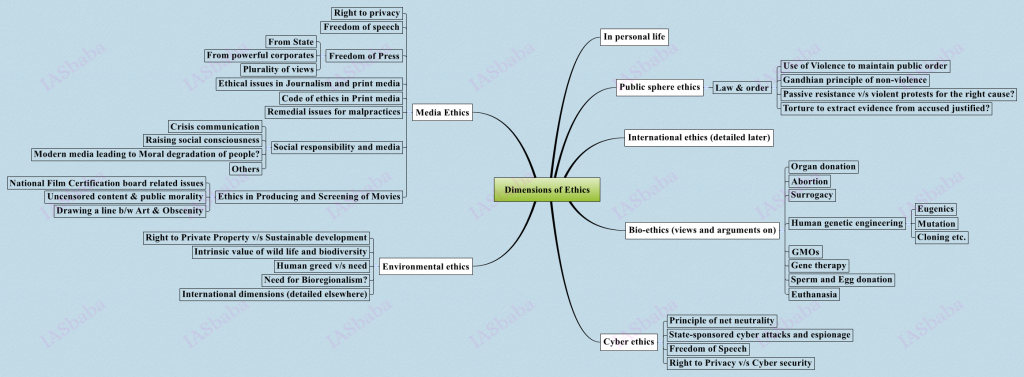

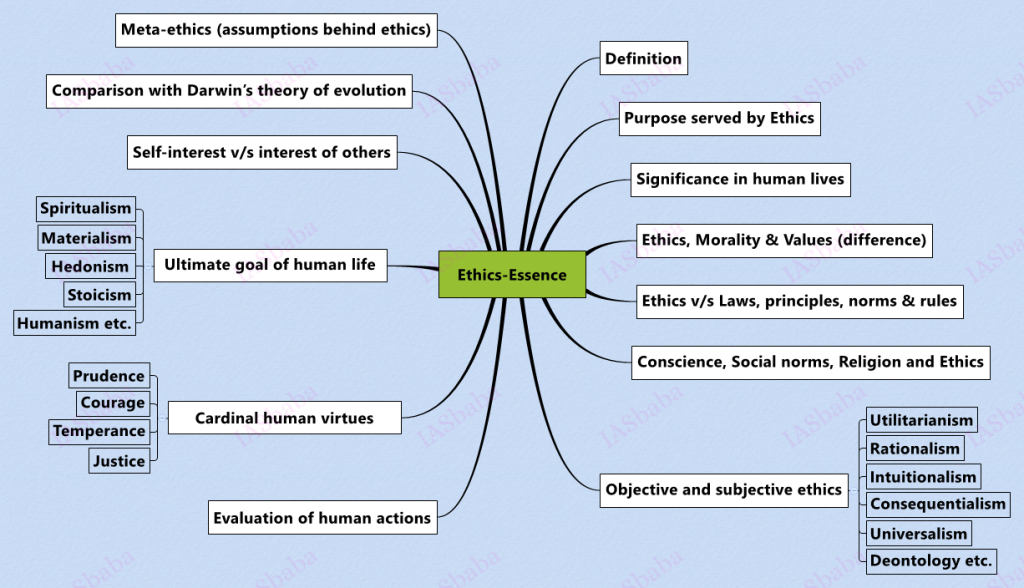
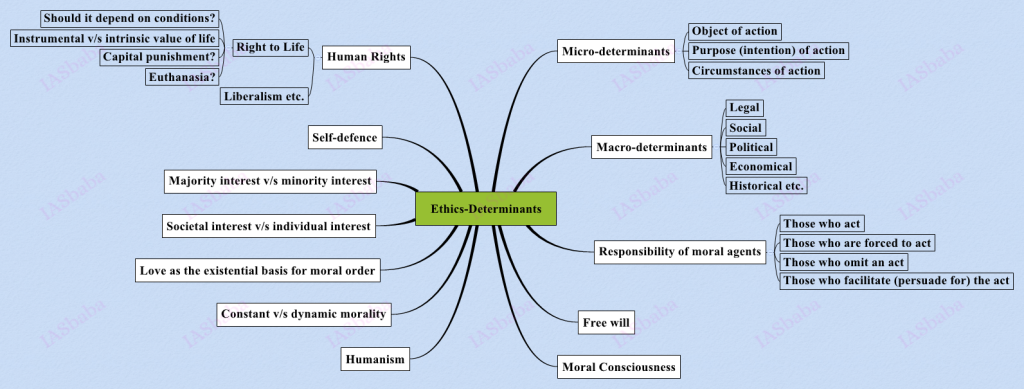

For the above refer to two sources:
One, the book – Ethics, Integrity and Aptitude by G Subba Rao and PN Roy Chowdhary – refer selected chapters. Since the book discusses the subject a little academically, you only need to grasp the overall understanding of the topic, and note some useful points that you can use in your answers.
Two, IGNOU Ethics material – (Download here)
- Chapter 1 and 2 of Block-1 Introduction to Ethics
- Chapter 3 of Block -2 Ethical Foundations
- Chapter 2, 3 and 4 of Block – 3 – Applied Ethics
- Chapter 1 and 2 of Block 4 – Current Ethical Debates
Three, Lexicon- More than Subba Rao- You can refer this book. Its short and precise.
These too discuss some academic stuff, but if you have gone through the detailed syllabus mindmaps, you will know what to leave and what to read.
No need to read in detail. Just gather ideas, concepts and way of dealing with the subject.
If you have covered the above, you will cover a large part of Ethic’s core syllabus.
2. Attitude: content, structure, function; its influence and relation with thought and behaviour; moral and political attitudes; social influence and persuasion
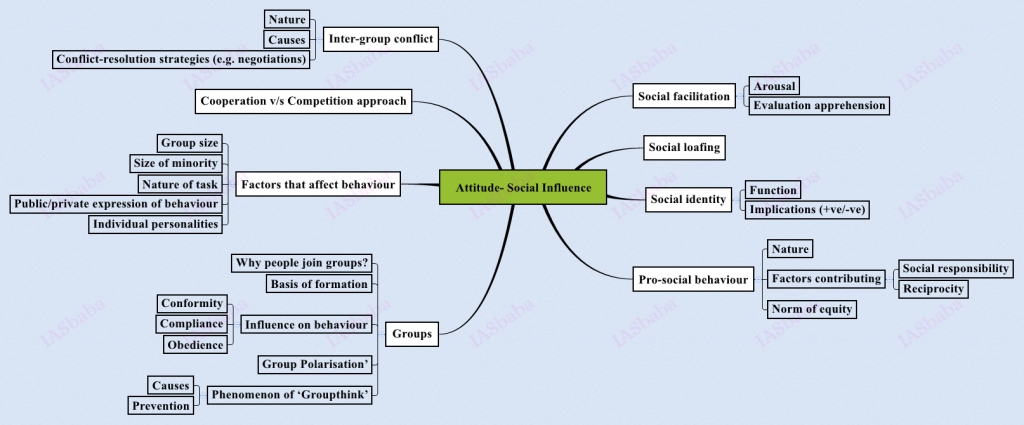
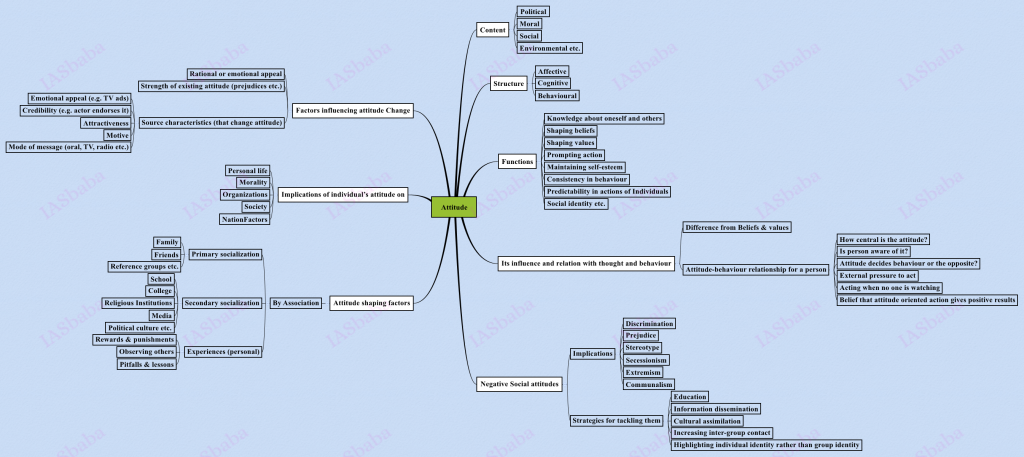


Read 12th NCERT Psychology – Chapter 6 on Attitude and Social cognition. Read chapter 7 – Social Influence and Group processes in a sketchy manner. Don’t go into details. Just grasp central ideas.
After covering these, cover only in-text examples/illustrations from the Subba rao book from the chapter on attitude. He has given several good examples that will help you understand the practical applications and case studies.
For moral and political attitude, a general reading on internet would suffice. Just understand the determining factors and their implications for our polity and society.
3. Aptitude and foundational values for Civil Service , integrity, impartiality and non-partisanship, objectivity, dedication to public service, empathy, tolerance and compassion towards the weaker sections

Go through Subba Rao’s exclusively dedicated chapters on aptitude in civil services. The highlights of your reading should be important examples; terminologies (their meaning and application in administrative life); constitutional and legal provisions; and contemporary developments (for e.g. the recent amendment in All India Service Conduct Rules; Bastar Collector Amit Kataria warned for violating service rules etc.)
4. Emotional intelligence-concepts, and their utilities and application in administration and governance.

You need not refer any other source than Subba Rao for this topic – dealt very comprehensively. Read the entire chapter line by line and solve all the questions given at the end of the chapter.
5. Contributions of moral thinkers and philosophers from India and world


You can refer to Subba Rao’s first few chapters for this OR IGNOU’s chapter 3 and 4 – Block 1- Introduction to Ethics. Need not read both.
Instead of mugging up their ideas and philosophy try understanding the context of their contributions; and their significance for present day world.
UPSC will either ask your opinion on their ideas or may ask you to name your favourite moral thinker and explain the relevance of his ideas for you and our society.
6. Public/Civil service values and Ethics in Public administration: Status and problems; ethical concerns and dilemmas in government and private institutions; laws, rules, regulations and conscience as sources of ethical guidance; accountability and ethical governance; strengthening of ethical and moral values in governance
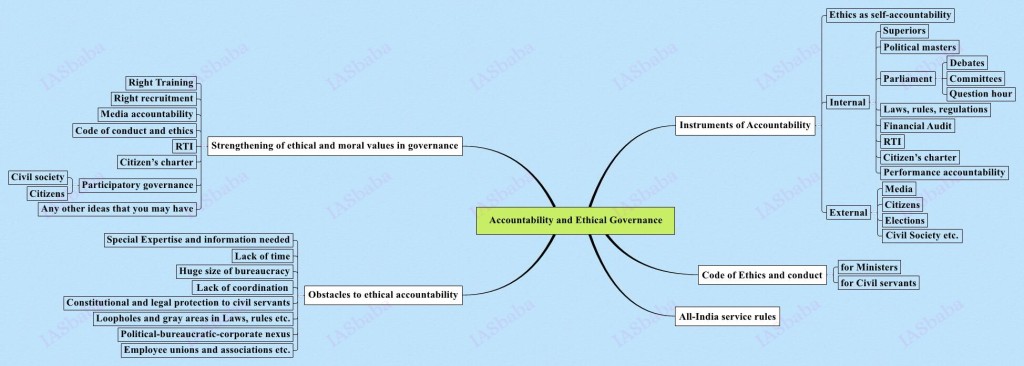



Since all these topics can have so many dimensions, first refer to the detailed syllabus mindmaps to understand the above in detail.
Then, first refer to Subba Rao. He has dedicated a lot of chapters specifically on all these topics. Need not go into detailed provisions, an overall view with certain important case studies /illustrations will do.
Then read, Ethical concerns in public administration by IGNOU
Combine the sources of this with the ones mentioned for Probity in Governance below.
Since questions from this topic will be based mostly from current affairs; you need not read too much static material for this.
You may be asked to give solutions to current administrative problems and dilemmas (like say whistleblowing), so keep your opinion on these issues ready.
7. Public/Civil service values and Ethics in Public administration: ethical issues in international relations and funding ; corporate governance.
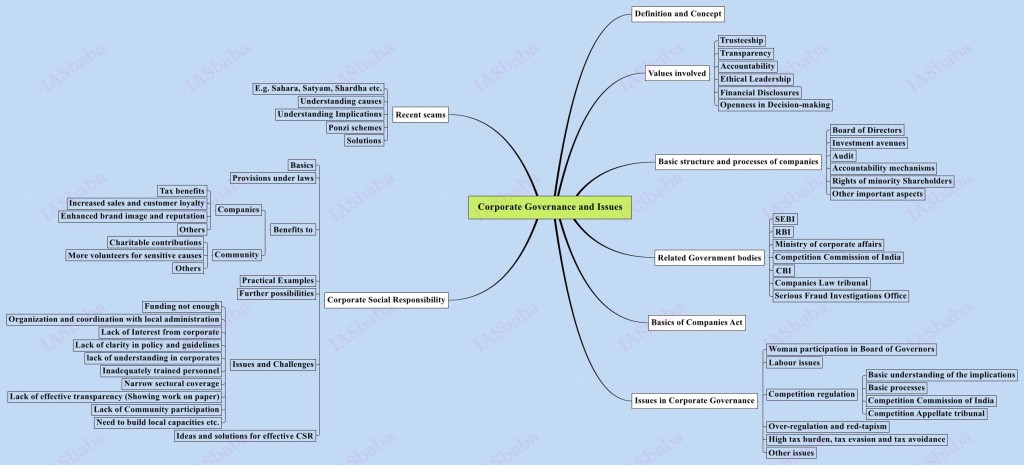

For Ethical issues in International relations, read IGNOU Chapter -1 – International Ethics of Block 3- Applied Ethics. This is more than sufficient to understand the concepts and related issues. Supplement your reading with ethical issues in contemporary international issues.
For corporate governance also, the most important is current affairs (e.g. Shardha scam, Sahara issue, Satyam scam, Companies Act, 2013, SEBI guidelines etc.). Make notes of major corporate governance related issues from newspapers.
For the static, first go to the detailed syllabus mindmaps and know the sub-topics under corporate governance.
After this read these very comprehensive and useful reports
Then from Subba Rao’s book cover some of the topics which are left out (see Mindmaps for how much covered by reports).
Finally, left out issues that have been mentioned in Mindmaps (not covered in Subba Rao), can be covered from the internet and About MCA in Ministry of Corporate affairs website.
8. Probity in Governance: Concept of public service; Philosophical basis of governance and probity; Information sharing and transparency in government, Right to Information, Codes of Ethics, Codes of Conduct, Citizen’s Charters, Work culture, Quality of service delivery, Utilization of public funds, challenges of corruption.

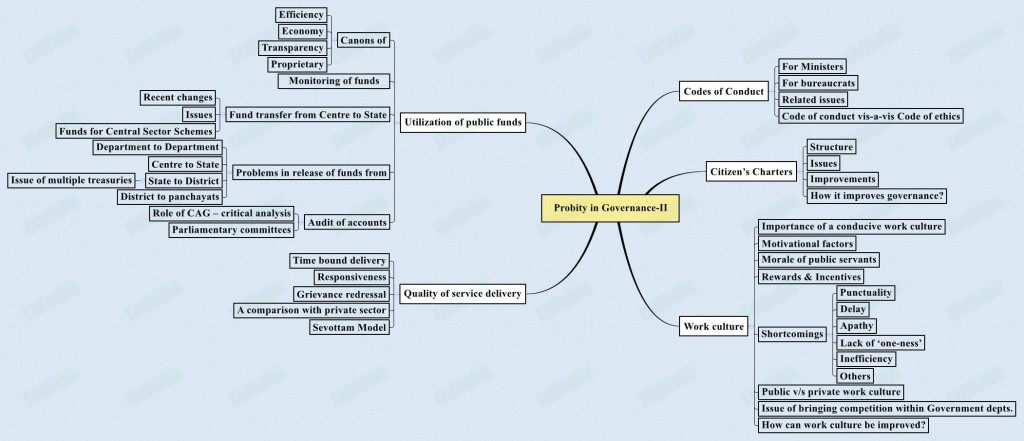
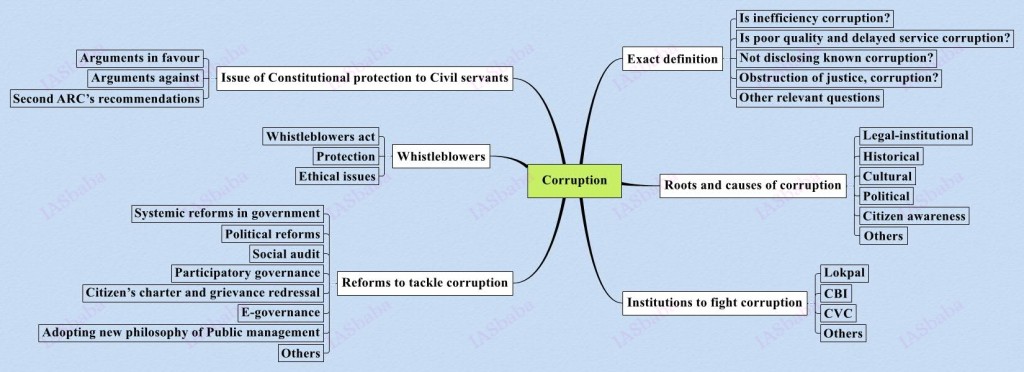
Again refer to the chapters dedicated to these in Subba Rao. That will cover a major portion. Topic of corruption has been dealt comprehensively in this book.
Then refer to 2nd ARC’s report on Ethics in Governance – Only first two chapters – Introduction and Ethical Framework.
Then read 2nd ARC’s report on Code of Conduct
Finally, go through some of the 2nd ARC’s
Very important and relevant questions are there in these questionnaires which can be verbatim asked in UPSC mains.
9. Case studies on the above
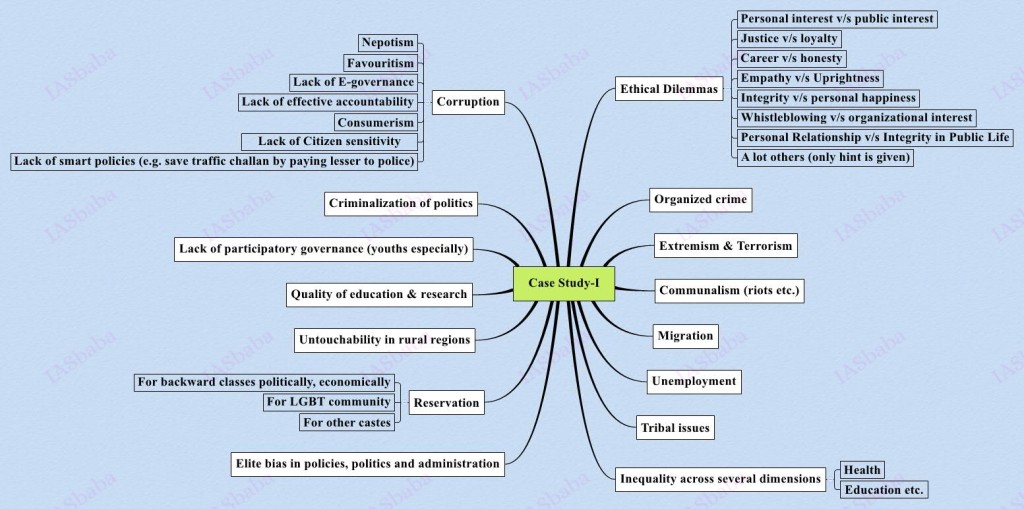
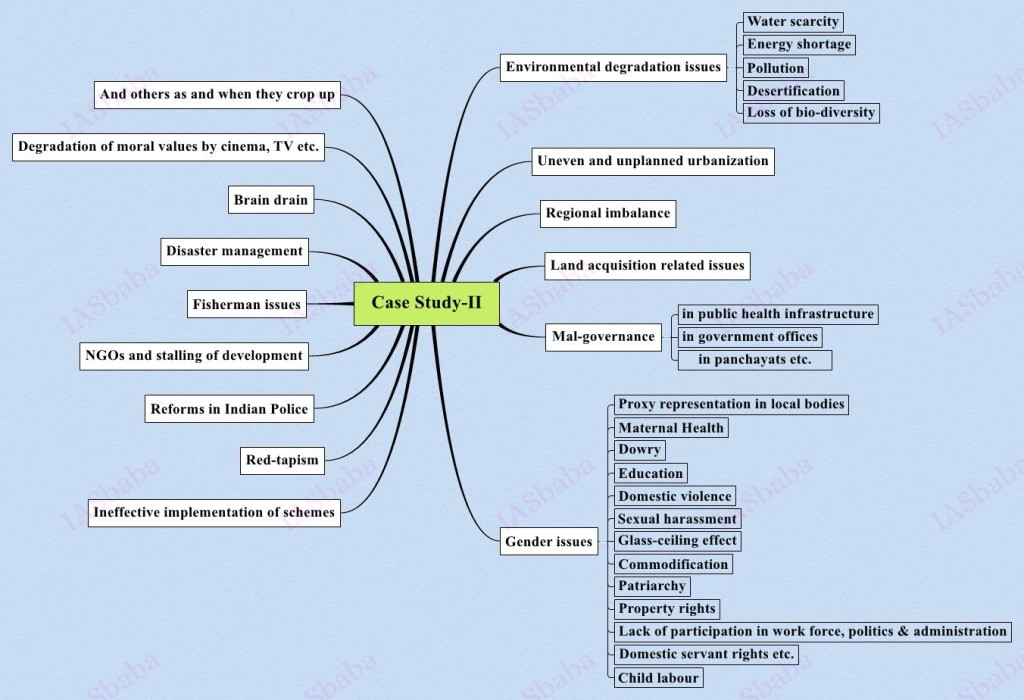
The detailed syllabus mindmap is very important to refer here. It opens up several dimensions of case studies.
Case studies will be not only from ethical issues but also present day burning problems like brain drain; reforms in Indian police; Land acquisition issues; disaster management etc. You should also refer to the previous year papers for some examples.
You can find some case studies on
Moreover, on our website we will be launching a separate section for Ethics questions and case studies. We hope that will be immensely helpful to aspirants.
Step 6: Right approach
Just keep these words from UPSC in mind before you start reading for this paper – “This paper will include questions to test the candidates’ attitude and approach to issues relating to integrity, probity in public life and his problem solving approach to various issues and conflicts faced by him in dealing with society.”
So, your approach matters more than your content in the examination. We have already talked in great detail about the right approach. Practice logical writing, because that shows coherence and order in your approach to situations. And, finally don’t only read moral stuff, do moral stuff!
Step 7: Writing practice with IAS Baba
We at IAS Baba believe in social capital. We are sure that this initiative shall see your enthusiastic participation and help you in your success.
Share your thoughts and feedback. It means a lot for the encouragement and enthusiasm of our Team 🙂


























